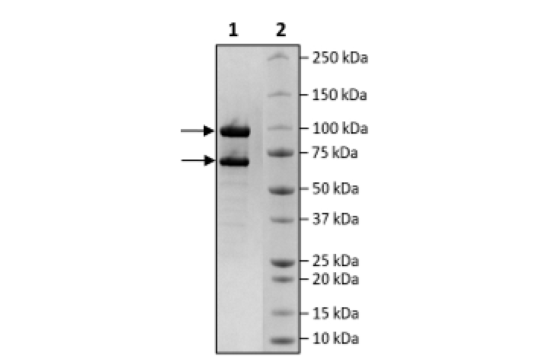CDK12 (696-1082)/CyclinK, GST-Tags, Recombinant
Recombinant human complex of CDK12 (cyclin dependent kinase 12), encompassing amino acids 696-1082, and full length CyclinK, encompassing amino acids 2-580(end). The CDK12 construct contains an N-terminal GST-tag followed by a Thrombin Cleavage Site, and human CyclinK contains an N-terminal GST-tag followed by a Thrombin Cleavage Site. These two recombinant proteins were co-expressed and affinity purified.
≥90%
Aqueous buffer solution
40 mM Tris-HCl, pH 8.0, 110 mM NaCl, 2.2 mM KCl, 20% glycerol, and 3 mM DTT
4 pmol/min/µg
The CDK12/CyclinK complex comprises human serine/threonine kinase CDK12 (Cyclin dependent kinase 12) and human cyclinK. CDK12 is ubiquitously expressed, being present at high levels in the reproductive tissues, endocrine tissues, bone marrow and lymph nodes, and is found predominantly in the nucleus of cells. CDK12 is involved in gene expression, transcription elongation, and genome stability. CDK12 binds only to cyclinK, and the formation of this complex seems important to maintain cyclinK stability. This complex regulates phosphorylation of serine 2 in the C-terminal domain of RNA polymerase II, which is responsible for transcriptional elongation and synthesis of full-length mature mRNAs. However, lack of CDK12 seems to only affect about 5% or less of the total transcription, indicating a selective role in the transcription of certain genes. The use of inhibitors, such as THZ531, indicated that the genes being selectively regulated by CDK12/cyclinK are the core DDR (DNA damage and repair) genes. CDK12 plays a role in cancer development such as in breast and prostate cancer. The use of CDK12/cyclinK inhibitors in combination with PARP (poly-(ADP-ribose) protein) inhibitors can increase the response of cells to PARP inhibition and cell death in cases of drug resistance. The development of CDK12 inhibitors, to be used alone or in combination therapy, is a promising field of research in cancer therapy.



